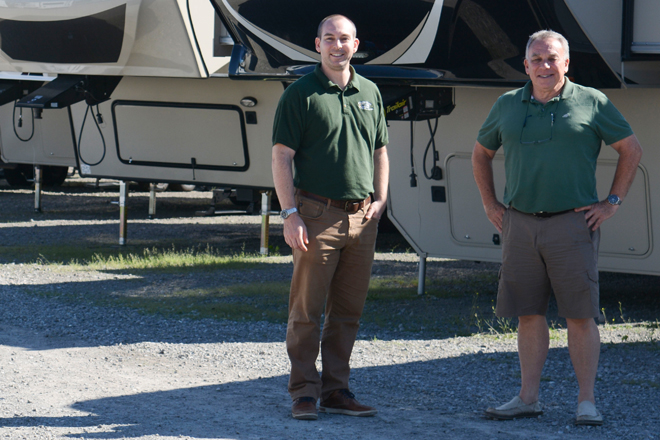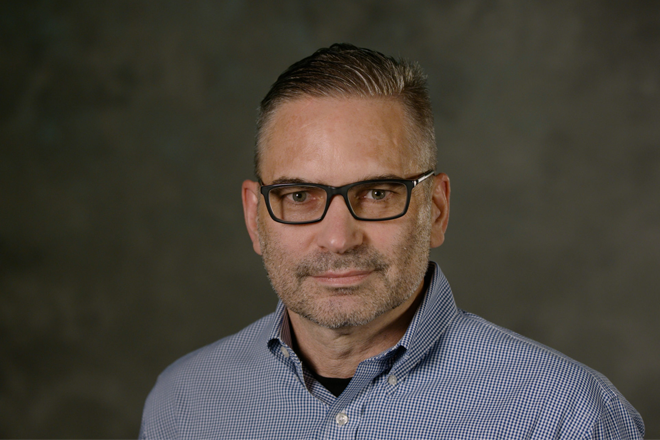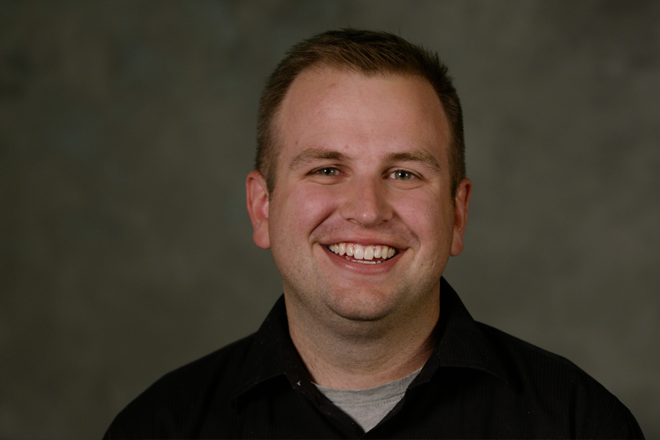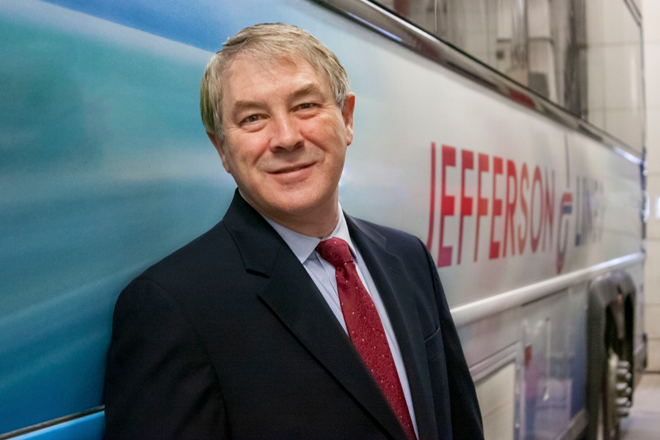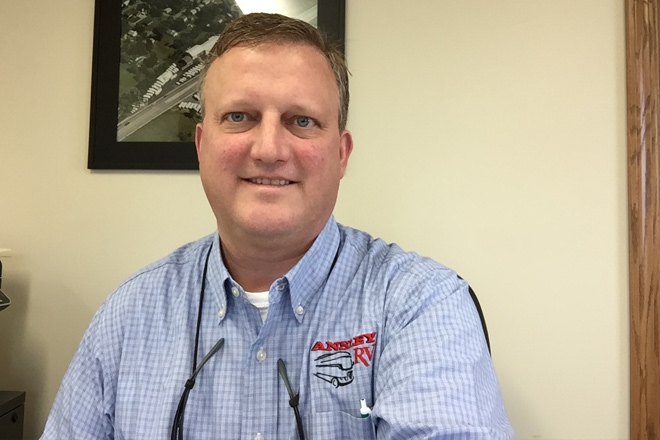How did you end up working with Spader?
Ken: That will take us back to 2008 and 2009 when the US was in serious recession, and Canada was supposedly not, but we were following in pretty good lockstep. A lot of our manufacturers of units we’re selling had gone bankrupt. Our inventories were too high, and the wrong inventories, because everything that hadn’t been selling was the really big expensive diesel and so on. The bank had never asked for any sort of curtailments which is equity that we have to put into unit that we have finance, and then they came up, and wanted huge amounts of equity, and we just didn’t know where to go. We thought, “What are other dealers doing? How are other dealers handling this? Are we the only one? Are the banks turned? Do they want more from us than other dealers?” It was a very, very stressful, unsettling situation, very hard mentally.
Andy had actually been asking me to go to Spader, but I didn’t really want to do that. I was afraid that, we thought we were doing, and we thought other dealers wouldn’t be doing it our way, or we might have been better than other dealers. I always didn’t want to do it. Finally I said, “Let’s see what’s happening with the rest of the world. Let’s try it.”
What was the tipping point for you?
Ken: It was just basically very, very tough times when you got desperate. I don’t know how to solve these problems. I do not know what to do. Let’s give this a try. “I doubt if anyone else can help me” went through my mind, but when we got down there, the amount of information and the amount of experience, and the amount of everybody handling it differently plus all of their input, it was a real learning thing, so that’s what started is what started me off thinking we have to do it. It’s just very tough times and not knowing how to handle them. Truthfully, we didn’t know what to do.
Andy: I remember at the time, Ken was really stressed. He didn’t know whether to … it was his life savings, right? He didn’t know whether to give that to the bank. We had no clarity. We didn’t know what any other dealer was going through. We weren’t sure if it was only us or if it was everybody. I remember saying, “Hey, why don’t we join Spader? Why don’t we go to 20 Group and just see what the heck is going on out there with everybody?” And then that’s when Ken said, “Okay, let’s do it.”
How did you get started?
Ken: We went to our first Spader [Total Management 1] meeting, and first of all Spader trained us. We had to go to a training course which showed us how to budget their way, and look at things their way, and then we went to a training course, and so after the training course, we went to our first meeting. Boy, it was like a breath of fresh air. Not only did … I find every other dealer within the same circumstance, but we found out how every other dealer was dealing with. It was a real eye-opener. It was just a huge weight off our shoulders.
Then the other part of it was the group we were in. They can see that I was stressed beyond belief. A few of them have been there several times, I think, any business gets you there once in a while. They took time to talk to me, and help me through that. It was just an amazing experience. John [Spader] introduced us as a new member, and told us where we were. All of the dealers in the group helped, and then after-hours, there were a few that really … they all helped, but there were a couple that really had been in my shoes before, and helped me as well as Andy dramatically. I realized I didn’t have to worry about sharing information. These guys were, a lot of them, certainly handled things a lot better than we did. We’ve never stopped learning, so that’s how we got going.
What was the hardest part about trying something new?
Andy: The hard part for us, I think, was to get over the privacy thing. You feel like you’re doing well in business. You feel like you’re pretty good, you don’t have anything else to compare to, but you feel like you’re pretty good. You feel like if you joined Spader, you’re going to give away these secrets, and people are going to copy and all that stuff. The beauty of it is, when we go there, we really realized that we don’t really have anything secret. Everybody is in the same business. They’re all doing the same stuff. They’re all doing it differently, and some are doing it way more successfully than others. Some are doing things successfully one way. Some people are really successful doing things another way. The bottom line is you learn from them all. You learn that you need to change. You learn how to get better. It just really opens your mind to change. It confirms that you need to keep making changes in your business, doing things in different ways. It allows you to learn from the dealers. You don’t have to reinvent the wheel yourself all the time.
Did the Spader training put you two on the same page?
Ken: It did. I always had my own way of budgeting. I’ve always been pretty accurate at it, but it’s my own system, and it’s a little … with that background in sales, basically what I couldn’t budget for was service, and parts, and warranty as well as finance and insurance like the business management office. Basically, I would run the business off the sales, and that’s what I had taught Andy to do. I couldn’t teach him how to do service or parts, because truthfully I didn’t know how. It sounds easy. Anyone who comes in might think, “Wow, how could you not know how to run a service department or a parts department?” Well, I’ll tell you it’s hard. It is brutally, brutally difficult, and it takes a lot of focus, a lot of time, and a lot of expertise. I just didn’t have it, that wasn’t my background.
When we went to Total Management 1, we looked at the Spader template, and it took into account of all of these things, and allowed us that showed ways to calculate them. It didn’t show us how to do it yet, but it showed us ways to calculate it, which allowed us to see that we were falling short dramatically on those things, and that opened conversation between the two of us about that. We realized that we failed to carry the load, but we were losing, our profits are flying out the door, through the shop, and through parts and everything. It’s taken us years of help. I’d say we’re getting very good at it now. It was Total Management 1 that started us talking about that.
It didn’t take us long to realize [Total Management 1] was just basically a goldmine if we could just learn how to mine it. We’ve never stopped working on that. I wouldn’t say our service is perfect yet, but my God, I say, compare it to other RV dealers, we are very good.
Did that carry into your conversations with other 20 Group members?
Ken: With the help of the Spader course as well as all the Spader members helping through that. If we needed a pay plan, if we needed a stocking level, if we needed to know how to handle obsolete parts, just on and on and on. We could phone those dealers and really excel in that area. No one ever says no. They’re all willing to help because areas that we excel in, we would get calls from them.
Did it take a while to build trust with your fellow 20 Group members?
Andy: Before we joined the group, [Ken] didn’t want to share, and didn’t want to really change anything, or do anything different. He was old school like the ways that he did it. When we joined the group, it’s really eye-opening that everybody is doing these things differently and very successfully. They told us that we’re not the best and our ways aren’t the best. It just opened, I think, Ken’s mind to change. It really confirms to me too that, and reassured me that change is good, it’s needed, and we need it in our organization, and really gave us both the motivation to make the changes and work together for that. It was just night and day after that with change.
Ken: I think if I’ve learned anything from Spader, I think the biggest lesson for me is before where I hated change, truthfully, now I embrace it. I have no issue with change. When something comes up and it needs change or tweak or something, boy, I am totally open to that. I didn’t like the change, because I was afraid of change. You really get entrenched in what you’re doing, and sometimes you cannot see the forest for the trees. The Spader experience is exactly as John says, “You can teach an old dog new tricks,” that’s the truth.
What change did you make early on that made the biggest impact?
Ken: Early on, our biggest problem was inventory. The big change was we simply had to get rid of this all this old bankrupt inventory, and especially the big heavy units that needed a lot of curtailment, a lot of equity from the bank. They were extremely hard to get rid off and we’d hold on, because we really wanted to make a buck. We realized it’s better just get rid of them, take the hit, lose whatever we have to. We put our heads together, and we made that happen. Andy got on the phone, and we decided to auction, and in fact, we came out of that just a little bit behind our cost, much less than we thought we’d ever have to take selling them on the lot. Getting inventory on the line was huge because it was the banks, we were the hero of the bank, because they were very happy to see us get rid of this old stock. It allowed us to get our flooring back.
Andy: It was better planning, better budgeting, focus on the right things: inventory, returns on that, keeping it current, getting the turns up. It was focused on people, getting their structure right, the process right, the right people in place, and we did all that. Spader helped us with all that. There’s no doubt the 20 Group, there’s the focus on the numbers and processes, just the whole business. It helped us with all that.
How has Spader helped you begin the succession planning process?
Ken: I think Spader has helped us realize that there as an end where someone like myself, that’s a little longer in the tooth, really needs to step back, and let the new generation take over. Things change pretty dramatically from computers, the internet, marketing, advertising, you name it. It’s a new world out there. They’ve been very helpful in getting our heads in the right frame of mind to do it. I guess, because we’ve really been working on the business, we haven’t achieved that yet, but it’s something that needs to happen sooner than later. Certainly Spader has helped us move down that road quite a distance.
Have you gotten your managers involved in training?
Andy: Yeah, we’ve done service manager training. We’ve done Total Management 1 and Total Management 2 ourselves. All the training is phenomenal. I think the level of detail that Spader gives financials and just insight into the numbers as well, helping point where the areas of concern or areas of opportunity are is huge. The training is also phenomenal for the different managers and the different departments, just training on process like in service, for example. It tells the service managers and service advisors exactly what they should be focusing on and getting done each and everyday through the day, before the end of the day, so when they do that stuff, it’s just a checklist and it makes it very simple. If they do that stuff, it works. It keeps the department going well.
Ken: It’s also helped us with our culture unbelievably. The fellows in service, the technicians – you know, sales fellows go to sales training, and they go to different shows, or we look at products with the manufacturer reps bringing them – it’s not really that way with service. They feel a little less than. And it’s hard for them to get the expertise they need, not just to fix things, but to run a business, to run that department, expense-wise, revenue-wise, budgeting. The Spader service program that we sent them all to for the last couple of years…
Andy: We’ve been sending all the service and parts people to another 20 Group, Service and Parts 20 Group.
Ken: This has caused our service people to really feel appreciated, to really feel that they’re becoming professionals. We have a culture down there where our management really wants to work with people and set the world on fire. We have a team with the same direction.
Andy: It shown us all a benchmark that we didn’t realize that we needed to hit. I think it’s shown the staff a higher benchmark. They may have thought they were doing great, sort of how we thought we’re doing great before we joined the 20 Group, but we soon realized the bar can be set a lot higher. It shows you how to get there. When you have the numbers and the measurements in place, you can start having a lot of conversations around those numbers and strategy, and how to get there, and process and what to do to get there. It really helps the people buy in.
Once the staff went to the training and the 20 Group, those ideas became their ideas, they would come up with the ideas and all of a sudden they would start taking full responsibility for their own success. We had a really good team because of it. It makes it fun.

